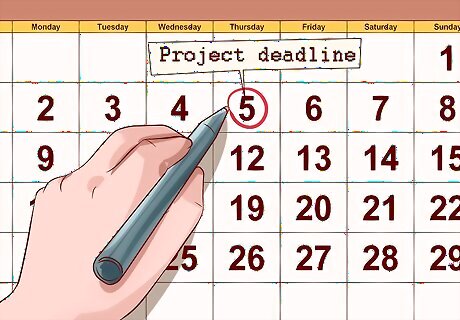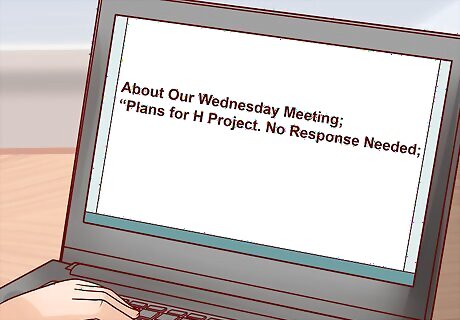
views
Communicating with your Boss

Write down your concerns before a meeting. Express your concerns in list form. This will help you focus your concerns, and it will iron out your frustrations so that you do not take them out on your boss. If you are anxious about meeting with your boss, you may also want to rehearse what you say to them beforehand.

Work using your boss' preferred communications style. Whether your manager prefers to discuss routine tasks with email, in person during meetings or on the phone, learn to utilize their favorite method. Furthermore, you should observe how formal or informal they are when they communicate with you and match that style.

Use “I” statements and avoid blame. When you approach your boss, state how you are working and how you feel. Avoid using “you” phrases such as “you should be doing better” or “you need to ___” These sound accusing and can threaten your relationship with your boss. Instead of saying “Nobody around here plans anything. Everything is so unorganized. You should be better at giving us information,” trying stating “I am struggling with scheduling in this office. I feel as though we do not organize effectively. Is there anything I can do to help improve communication?”

Ask questions. A disorganized boss may give conflicting advice or cumbersome tasks. If you are confused about what you need to do, politely ask for clarification. It is best to ask as you receive the tasks. Phrase your questions in a positive light so that it doesn’t seem like you are complaining. Instead of saying “why do we have so many meetings when we don’t do anything important?” try stating it this way: “Since we’re all so busy with our work, is there any way we can have fewer but more productive meetings?” You can also use “I” statements while asking. Try saying, “I was wondering which task has the highest priority for this week.”

Give your boss solutions. If you have a problem, come to your boss with a few solutions already in mind. You can let your boss decide which solution will work best, but by preparing ahead of time, you are making it easy for your boss to respond to the issue. Start the conversation by telling your boss you have both a problem and some potential solutions. Be sure to tell them at the beginning that you want their thoughts on the matter. You can say, “I just wanted to bring an issue to your attention. I have a few possible solutions for the matter, and I wanted to run them by you.” If your boss rejects your solutions, try asking what you can do instead to solve the problem. You can say, “What do you think is the best way we can handle this situation?”

Thank your boss. When your boss does manage to give you something on time or help you, thank them. Even bosses want appreciation and praise. By showing your gratitude, not only will you increase your rapport but you will encourage your boss to continue such behavior.
Organizing your Office

Keep notes during meetings. Share the information with your disorganized boss and any key team members to ensure that everyone understands what is expected of the team and individual players.

Plan regular organizational meetings. Ask your boss if you can discuss the week's priorities on a regular basis. By having a consistent time every week that you enforce, your boss will begin to conform to a schedule. Choose a good meeting date that works for both of you. During the meeting, create weekly goals and confirm task assignments. Review your mutual accomplishments a week later.

Schedule ahead and send reminders. If you need a meeting or some information from your boss, give them plenty of time to respond. If you do not receive a response in a timely fashion, a gentle reminder will help motivate an answer. By giving them plenty of time, you will increase your chances of a response. EXPERT TIP Alyson Garrido, PCC Alyson Garrido, PCC Career Coach Alyson Garrido is an International Coach Federation accredited Professional Certified Coach (PCC), Facilitator, and Speaker. Using a strengths-based approach, she supports her clients with job search and career advancement. Alyson provides coaching for career direction, interview preparation, salary negotiation, and performance reviews as well as customized communication and leadership strategies. She is a Founding Partner of the Systemic Coach Academy of New Zealand. Alyson Garrido, PCC Alyson Garrido, PCC Career Coach Try following up with your boss, as well. If you have a forgetful boss, you might need to help remind them about things. For instance, if you're having a conversation, you might need to set a deadline with your boss of when you'll follow up, the same way they may do with you. Think about the way they communicate, as well. If you send a text, they might forget, because they're not fully engaged when they look at their phone. If you send an email, on the other hand, they can flag that so they'll remember it. Learn their preferences so your message isn't lost.

Talk to your coworkers. Just as you should communicate with your boss, you should be working with your coworkers as well. Understand what issues they have in the workplace and come up with management solutions that work for the whole office. You can use “I” and “we” statements here too. Try asking, “I have noticed that our files are disorganized. I was wondering if you had similar problems. What can we do to fix this?” Include your boss in the conversation. Otherwise, it may seem as though you are plotting behind his or her back.

Volunteer for unfinished or disorganized tasks. By taking initiative around the office, you are positioning yourself as a valuable team member and leader. This can boost your chances of promotion. Furthermore, it will remove the burden from your boss, giving them more time to focus on planning and productivity. Your boss is probably under extreme pressure as well. Be understanding of your boss' stress as you volunteer to help manage tasks.
Organizing your own Work

Streamline paperwork. If you want your boss to read certain documentation, create a top sheet summary of short, concise bullet points explaining the most important ideas contained in the document. Provide your boss with a general understanding of the handout to save time for more important projects that require direct collaboration.

Keep a schedule. Create your own schedules for project dates and deadlines. Ask your boss if your project management ideas coincide with project expectations. If the schedules work, then you will have given your boss a pre-prepared agenda to follow, boosting their productivity. If they do not, you may have to make minor changes, but you will at least have a calendar to lessen the disorganization around the office.

Practice good email etiquette. If you email your boss, the subject line should clearly state the intent or contents of the email. If you are sending them an attachment, write a brief summary in the body of the email about what the attachment is. This will make it easier for your boss to find the email later, and it will decrease the amount of time they spend searching for your communications. A good subject line should be no longer than 8 words long. You can indicate if you want a response. It should be specific. Example: “About Our Wednesday Meeting”; “Plans for ____ Project. No Response Needed”; “Increasing Our Traffic. Thoughts?” Do not use phrases in the subject line like “hello” or “how are you,” and avoid using all caps.

Delegate tasks. Don’t try to handle the organization of the office on your own. Work with your team and delegate tasks to those who are best equipped to handle them. This will spread the work out amongst your coworkers and ease the burden on your boss.



















Comments
0 comment